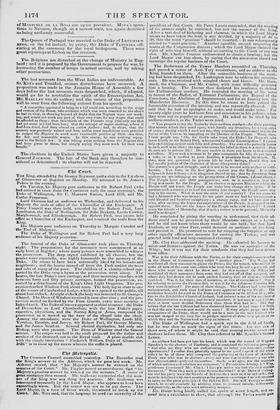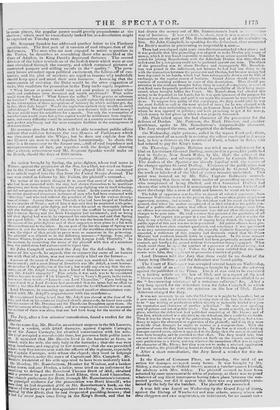Mir fEirtroyoUst.
The Common Council assembled vesterdey. The Recorder read the King's answer to the Address,whiels we gave last week. Mr. Aahnrst moved, that " his Majesty's answer be entered on the ntinutes of the Court." Mr. Figgins moved an amendment, that " his Matjesty's gracious answer he enter, d on the minutes." A scene of great confusion then ensued. Mr. Gelloway contended that the man- ner of the King was any thing but gracious. Mr. Galloway was interrupted repeatedly by the Lord Meyor, who eppears to have been exceedingly warm. But the orator was not to be put down. 'Abe Lord Mayor, in a tone of fierce wrath, threatened to break up the Cinirt. Mr. Wire said, that the language he used was unworthy of the president of that Court. Sir Peter Laurie contended, that the wording of the answer might be criticized, but not the manner of the King. After a vast deal of bickering and clamour, in which the Lord Mayor seems to have taken the lead, it was decided, by a majority of 46 to :e4, that the word "gracious " should be iteserted. -. It was subsequently altered to " most gracious." Another squabble ensued respecting the toasts at the Corporation dinners ; which the Lord Mayor claimed the right of seleeting himself, without accounting to the Court or any one else. Mr. Charles Pearson endeavoured to obtain a hearing; but the Lord Mayor cut him short, by saying that the discussion should not interrupt the regular business of the Court.
The Reformers of the Tower Hamlets assembled on Thursday, and passed a series of Anti-Tory resolutions, and an address to the King, founded on them. After the ostensible business of the meet- ing had been despatched, Dr. Lushington rose to address his constitu- ents. He was received with mingled cheers and his Mr. Ham- mack, the Chairman, and Mr. Coates, with some difficulty procured him a hearing. The Doctor then declared his readiness to defend his Parliamentary conduct. He reminded the meeting of his votes in favour of the Ballot, of Triennial Parliaments, the Repeal of the Corn-laws, the Abolition of Impressment, and for an Inquiry into the Manchester Massacre. By this time he seems to have gained the favourable attention of the meeting, and was repeatedly cheered. He said that he had no apologies to make, and would make none. For twenty-eight years he had been firm and consistent in his polities, when they were not so popular as at present. He asked to be tried by his uniform conduct, as the Tories were tried.
" You propose to try the Tories by their uniform conduct—for their pursuing that system which they acted upon, with hardly any deviation, for a hog series of years ; during which I need not say, they constantly endeavoured to gain the favour of the Crown, by trampling on the liberties of the People. When. then, I hear people say, Oh, for God's sake trust the Duke! for Heaven's sake listen kindly to Sir Robert Peel, who carried Catholic Emancipation !' I cannot help exclaiming against such folly and absurdity. The man who patiently listens to such stuff is au idiot ; the man who avows his belief in them is a traitor.
do men act in private life? Do you confide in those you know to be canvicted swindlers. If you seek a woman to be your companion for life, do you take as a wite, or as a mother to your families, a prostitute from the streets. If, then, men are governed in pi ivate life by such feelings, should they not feel equally jealous of the character of those who govern them a The present is a great struggle, and it is not to be treated with neglect or iedif- fercnce. You have, in the first place, against you the King. It is utter folly—it is false delicacy—it is altogether absurd to say, that by disenssing these matters we are infringing on the prerogatives of the Crown. (Loud cheers.) The People have also their prerogatives ; and, be it recollected, that the King was made for the People. If he chooses to appoint Alinisters when, the People will not trust, the People can make him change them spin. If he pursues such a course as to lead the country into danger, the People must stop him in his career. What is now the state of our country? For tett years we had a Monarch who was insane; for ten years more we had fur his successor cold-blooded and heartless voluptuary ; a change came, and we have now one who, after exciting the hopes and expectations of the People, is prep-tied to dis- appoint them. Butt are the hopes of the People to be now blasted ? I would warn the friends of Monarchy, that ifsuch a course is to be pursued, Morarchy itself is in danger."
He concluded by giving the meeting to understand, that their ad- dress could not be presented by their Members except at a Levee, and he .did not know when there would be one held ; but that Lord Durham, or any other Peer, could demand an audience of tie., King and present it. He promised to vote for snipping the Supplies, or any other equally efficacious measure for ousting the Tories ; alit! was greeted with loud and long-continued cheering.
Mr. Clay then addressed the meeting. He exhorted his hearers to union and firmness against the Tories. He was no apologist of the Whigs; but it was not for their misdeeds that they had been driven from office.
Was it for their dalliance with the Tories, or for their complaiettice to what in the House of Commons they called " another place?" The Wttigs had mutilated all their measures to please the Peers ; like the tyrant, who wished to make all men of the sante size—those who were too lung he cut a p ere oil, and those who were too shot t he drew out. In this manner the Whigs had mutilated all their measures ; front some they had cut off all that was good, and others they had drawn ont to such perfect tenuity, that all that wa, valuable• vanished. Was it for their sins of omission, or sins of cominissien ? Was it for refusing to revise the Pension-list, or was it for the infamous Gel:cirri Bill, they were dismissed ? For none of those things. The Cabittet bad it en twice reconstiucted, and each time had been mute approved of by the Pet ph,. The resolution brought forward in the Howe of Conunotal on the '27th of M :y, rela- tive to the Established Church of Ireland, had induced a one of the me.t.bers ti- the Administration to resign ; and its new members, if nut tnen ot equal talent, were at least more decided Reformers than those that had let'. Dis they believe that the late Cabinet had been dismissed because it hall dotie t o little, or that the new Government would do more? If they might judge :ro it the compauions of the Duke, there would not be a man mu the 11V.V Calill.it who was not steeped to the very lips in pledges against all those vi y tits.:stieus oa, which they and the Nation took so deep an interest. The Duke of Wellington had a quick eye in the fichl of battle, but he was slow to mark the signs of the times. I;e was cute of those men, of whom it might be said, that coining events itever cast shadows before theta. Mr. Clay then referred to Mr. Sistbkic's Second Letter.
An address had been put into his hand, which was the second of 8,-rgeant Spankie's to the electors of Finsbury, and it contained the foliowing passege-- " But who are they who are endeavouring to bring rim into etic.1 itetilous experiments? I confess they generally appear to me (attd. ; spesk of the whole tribe) to be of those who composed fli ? gathei ing at the Cave of .Atbdtart. Every one who was in distress—every one will, was in debt—evety one who was disrontented—cathered themselvee. Such, ro all ages, are the materials of whirl) sedirroo atal rebellion are composed." ( Tremendous hissing.) "Why, getttlemen (continued Mr. Clay ). I ttatsp!e took r Inv foot the coot .tuptible document." Were they such as wee e therein described ? It th: Duke of ul'ellinr- ton and his party were the .friends of Reform they were re, rise.tte.1 to h.% they must he delie bred ii ith such meetings as the press-tali-meetings ef in tr de:ermined to early on the great principle t,f the Reform Rill. But still timegn tto deter- mined, he o 'old conclude by advieing them to pcorwed calmly, deliberately, and prudently, as the cello must ultimately conquer. 111 r. Hume being loudly called for. spoke at some length, and en- tered into a calculation to show, that al:fa:ugh the Tot!es would gain in some places, the popular power would greatly preponderate at the election ; which meet be immediately looked for, as a dissolution might be expected on Tuesday next.
Mr. Sergeant Spanitie has addressed another letter to his Finsbury constituents. The first part of it consists of cool vituperation of the Reformers. The men who are now engaged in active opposition to the Tories, he describes as resembling those who assembled at the Cave of Adullan, in King David's depressed fortunes. The second division of the letter reminds us of the foolish tracts which were at one time circulated through the country, tied which contained pictures of contented paupers and willing vassals to the " quality." The pecu- niary losses attendant upon political excitement, the falling-off of euse turners, and the glut of markets, are urged as reasons ItCy tradesfolk should keep quiet and mind their own business. Asserting that the consequence of resisting the Duke would be the utter stagnation of trade, this candidate for promotion in the Tory ranks sagely inquires- " What farmer or grazier would raise and send produce to market when credit and confidence were desttoyed and wealth annihilated ? 'What miller would trust the baker? What farmer the miller ? What grazier or salesman the hotelier? What resources, what credit, would replace the deficit occasioned by the interruption of those occupations of industry by which millions get, day
by day, their daily bread ? Would the capitalists em .
batk their wealth useful
undertakings? Would bankers and monied men discount bills or lend money? No man would trust his neighbour for a month. Not only the consumption of manufactures would cease but active capital would be withdrawn from employ- ment, and every difficulty would be accumulated in a country accustomed to the most perfect maehinery and the must complete facilities ha the management of all transactions."
He assumes also that the Duke will be able to conduct public affairs without that collision between the two Houses of Parliament which was threatened under the Whigs; but he does not explain how the two Houses are now to work together harmoniously. In short, this letter is a fit successsor to the former one,—full of cool impudence and misrepresentation of fact, put tegether with the design of showing what a clever, subservient tool Mr. Sergeant Spankie would make on the Bench, should the days of ISIS return.





















 Previous page
Previous page